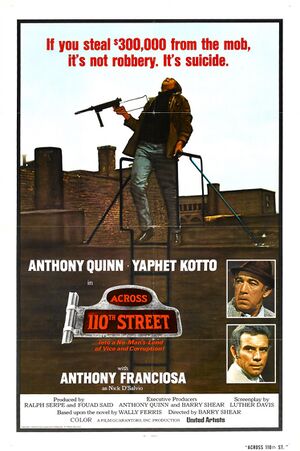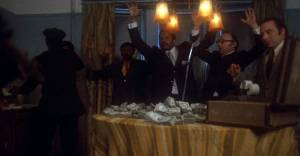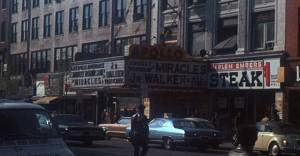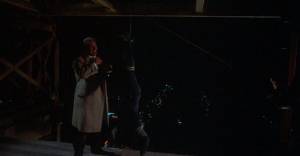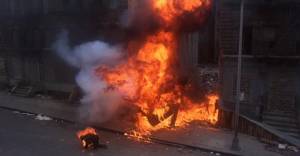Across 110th Street
From The Grindhouse Cinema Database
Revision as of 12:21, 23 March 2011 by TayvisDunnahoe (talk | contribs)
|
|
Tagline
- If you steal $300,000 from the mob, it's not robbery. It's suicide.
Main Details
- Released in 1972
- Color
- Running Time: 102 Min.
- Production Co: Film Guarantors
- Distribution Co: United Artists (1972) (USA) (theatrical)
Cast and Crew
- Directed by Barry Shear
- Written by Wally Ferris & Luther Davis
- Starring Anthony Quinn, Yaphet Kotto, Frank Adu, Frank Arno, Joseph Attles, Paul Benjamin
- Produced by Anthony Quinn, Fouad Said, Ralph B. Serpe, Barry Shear, Richard Stenta
- Cinematography by Jack Priestley
- Film Editing by Byron 'Buzz' Brandt, Carl Pingitore
Synopsis
Across 110th Street is a 1972 crime genre film Directed by Barry Shear and Starring Anthony Quinn, Yaphet Kotto and Frank Adu. It features the classic soul title theme sung by Bobby Womack which gained a resurgence in popularity when Writer-Director Quentin Tarantino used the theme for the opening/closing of his 1997 crime film Jackie Brown starring Pam Grier.
Review
Across 110th Street opens to a quiet room where mobsters count out their cut from drug dealers under their control. Two robbers enter the house disguised as police officers. After one of the drug dealers reaches for a gun, the robbers open fire on the entire room killing everyone and they narrowly escape with over $300,000.
Enter the dinosaur detective Captain Matelli (Anthony Quinn) who meets the young, idealistic Lt. Pope (Yaphet Kotto). Racial tension ensues. On the other side of town, Nick D'Salvio (Anthony Franciosa) is charged with finding the men who took the mob's money and making an example of them. The plot thickens as the Black crime syndicate of Harlem begins there own search (with prejudice). Jim Harris (Paul Benjamin) plays the sympathetic anti-villain. He's an ex con that feels there are simply no other options. His plan was to get the money, take his wife, and get the hell out of Harlem. With all of the heat drawn down on him and his two friends, he's forced to go into hiding instead.
Too often, films portray distinct good/bad characters with happy endings to button up an otherwise tragic story. With Across 110th Street you'll find that every character in the film has dirt on them. The "good guys" are clearly flawed while the "bad guys" display several genuine characteristics. There's a common nature to all the characters in this film. From the psychotic mob enforcer who is secretly seen as bumbling and is expected to fail to the career cop who can't force any information from his sources because he's been on the take for the majority of his career, this movie provides a believable atmosphere for a crime ridden society. In the end, no one is purely good, or bad. Everyone pays a price. Good stories don't necessarily need positive, tidy endings. It can be a relief at times to end a film in a tragic mess, which is what you'll find with Across 110th Street...no heroes.
In addition to a strong narrative and characters, Across 110th Street moves at a very nice pace with violent action at every turn. Played out against the back drop of an early '70s New York City, this movie is transformed into one of the grittiest US crime flicks from 1972. Great casting and a memorable soundtrack provide a memorable viewing.
It is also important to note the direction of this film. Conventional wisdom dictates that Director's who hold mostly made for TV credits either stayed out feature film due to limitations of talent or possibly edge. In Barry Shear's case this absolutely has no basis. As early as 1950, Shear began a career in television directing several episodes "Newsweek Views the News" he would later contribute to many well known series including The Man From U.N.C.L.E., Hawaii Five-O, Daniel Boone, and Tarzan (1967-68).
Shear directed one feature film, The Karate Killers (1967) that was actually developed from an episode of The Man from U.N.C.L.E. Although considered to be one of the weakest films from the U.N.C.L.E. franchise, Shear would go on to direct the landmark counter culture vehicle, Wild in the Streets (1968). Continually working in television, Shear added The Todd Killings to his feature film roster in 1971 just prior to directing Across 110th Street. His final feature film came about in 1973 with The Deadly Trackers, a revenge western starring Richard Harris. From 1973 on, Shear would remain in television adding several series and made for TV movies to his thirty year resume up until his death 1979.
Although Shear's film stats are limited compared to his TV credits, the presence of Wild in the Streets and Across 110th Street alone display his range as a director. While both of these films are completely different in content and expression, they both show the marks of a fully trained directorial sensibility. To Shear's credit, neither film displays a "made for TV" feel like many other productions from crossover directors of the same era. Shear clearly knew where the lines were and when exactly to cross them.
In all, Across 110th Street is worth watching (several times). It's tightly wound and doesn't pull punches.
Reviewed by Texploited March 22, 2011












